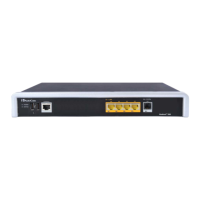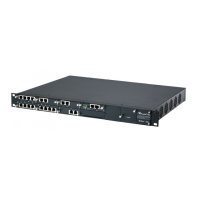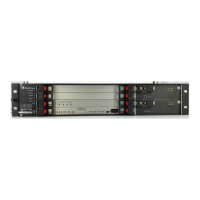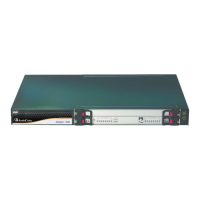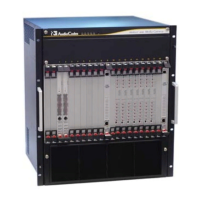User's Manual 672 Document #: LTRT-27055
Mediant 1000B Gateway & E-SBC
answer transaction completes. The offer-answer options can be included in the following
SIP messages:
Offer in first INVITE, answer on 180, and no or same answer in the 200 OK
Offer in first INVITE, answer on 180, and a different answer in the 200 OK (not
standard)
INVITE without SDP, offer in 180, and answer in PRACK
PRACK and UPDATE transactions can also be used for initiating subsequent offer-
answer transactions before the INVITE 200 OK response.
In a SIP dialog life time, media characteristics after originally determined by the first
offer-answer transaction can be changed by using subsequent offer-answer
transactions. These transactions may be carried either in UPDATE or re-INVITE
transactions. The media handling is similar to the original offer-answer handling. If the
offer is rejected by the remote party, no media changes occur (e.g., INVITE without
SDP, then 200 OK and ACK, offer-answer within an offer-answer, and Hold re-INVITE
with IP address of 0.0.0.0 - IP address is unchanged).
The device supports various interworking modes for early media between SIP UAs (i.e., IP
Groups):
Early Media Enabling: The device supports the interworking of early media between
SIP UAs that support early media and those that do not support receipt of early media.
Early media can arrive in provisional responses to an INVITE request. The device
forwards the request of early media for IP Groups that support this capability;
otherwise, the device terminates it. Provisional responses whose SDP are suppressed
are changed to a SIP 180 response. This feature is also supported for delayed offers.
This is configured using the IP Profile parameter, 'SBC Remote Early Media Support'.
The device refers to the parameter also for features that require early media such as
playing ringback tone.
Early Media Response Type: The device supports the interworking of different SIP
provisional response types between UAs for forwarding the early media to the caller.
This can support all early media response types (default), SIP 180 only, or SIP 183
only, and is configured by the IP Profile parameter, 'SBC Remote Early Media
Response Type'.
Multiple 18x: The device supports the interworking of different support for multiple
18x responses (including 180 Ringing, 181 Call is Being Forwarded, 182 Call Queued,
and 183 Session Progress) that are forwarded to the caller. The UA can be configured
as supporting only receipt of the first 18x response (i.e., the device forwards only this
response to the caller), or receipt of multiple 18x responses (default). This is
configured by the IP Profile parameter, 'SBC Remote Multiple 18x Support'.
Early Media RTP: The device supports the interworking with remote clients that send
18x responses with early media and whose subsequent RTP is delayed, and with
remote clients that do not support this and require RTP to immediately follow the 18x
response. Some clients do not support 18x with early media, while others require 18x
with early media (i.e., they cannot play ringback tone locally). These various
interworking capabilities are configured by the IP Profile parameters, 'Remote Early
Media RTP Detection Mode', 'SBC Remote Supports RFC 3960', and 'SBC Remote
Can Play Ringback'. See the flowcharts below for the device's handling of such
scenarios:

